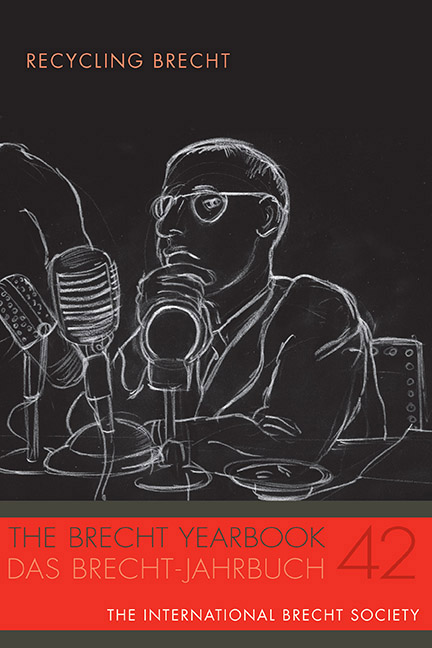A Model Family in a Model Home or a Tale of Fictitious Capital
Published online by Cambridge University Press: 09 April 2021
Summary
I am an artist and filmmaker. I think of my work as a process of drawing timelines between past and present that might help us imagine a future against the grain of reactionary ideology. For me the best place to start is with fragments: ideas cut short; abandoned victims of forces beyond their control; forces of culture, politics, and economics.
I find myself drawn back to a certain time in history, roughly from the 1920s through the 1940s. I believe we can learn from the work of artists and filmmakers who attempted to communicate with a mass audience in a way that was both critical of the status quo and optimistic in that they wanted to show that things can be other than they are. It was during the economic crisis of 2008 that I started to think that Brecht's writing might help us understand what was going on. And it seemed to me here in the United States that the best place to look to him for guidance was in Los Angeles. As I researched his work in Hollywood, I became intrigued by his sketches for films that he had not been able to realize. One in particular caught my attention, A Model Family. Only a few typed notes and some scrawled notebook entries remain. One reads as follows:
A MODEL FAMILY
ein bild der zerstörung: zertrümmertes wohnzimmer, brief eines anwalts über scheidung, zerfetzter frauenhut. überschrift: a model family home. man sucht die familie unter 80 familien aus. was alles nicht in betracht kommt….
am vorabend der ausstellungseröffnung ein krach, bez ein irrtum. mann
Brecht based his idea on an article in Life magazine from 1941, “A Model Family in a Model Home,” that describes how an Ohio farm family won a prize, a week in a model home at the state fair. The drawback was that the home was open to the public twelve hours a day. I felt that its themes, architecture as a representation of social and economic relations, surveillance, spectacle, and the commodification of family life resonated in our century.
Brecht's work in Hollywood has often been considered a failure. On the contrary, I would like to suggest that his ideas were merely lying in wait for us.
- Type
- Chapter
- Information
- The Brecht Yearbook / Das Brecht-Jahrbuch 42Recycling Brecht, pp. 228 - 243Publisher: Boydell & BrewerPrint publication year: 2018



